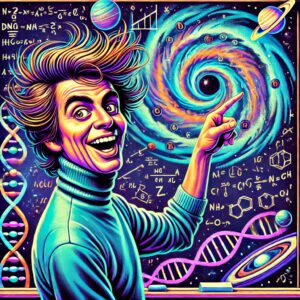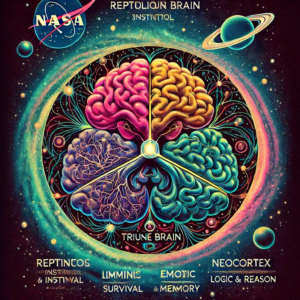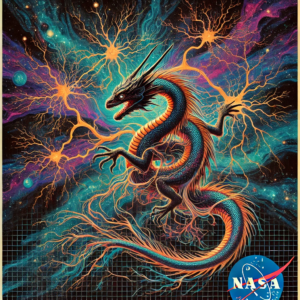A Thought-Provoking Exploration of Intelligence
Introduction: A Unique Look at Sagan’s Masterpiece
Carl Sagan’s The Dragons of Eden isn’t just another book on human intelligence—it’s an interdisciplinary fusion of science, philosophy, and speculative inquiry. Published in 1977 and awarded the Pulitzer Prize for General Non-Fiction in 1978, this book stands at the crossroads of evolutionary biology, neuroscience, anthropology, and mythology. This book gets a little academic and dry at times, but Carl Sagan beautifully applies his literary touch to elevate this beyond another dry classroom textbook. I appreciate his candor and skepticism to the opinions of others.

Here’s some highlights:
- Genre Hybrid: It’s not just science—it blends cognitive psychology, speculative futurism, and historical analysis.
- Length & Readability: This is a quick read. Especially if you start skimming the boring parts like I did. At just 288 pages, it’s a digestible read, making it accessible without sacrificing depth.
- Inspiration & Influence: Sagan was influenced by Paul MacLean’s Triune Brain Hypothesis, a now-debated but still insightful model of brain evolution.
- Hidden Gem: One of the most overlooked aspects of the book is its deep connection between mythology and evolutionary biology, an area rarely explored in mainstream science writing.

For those who enjoy mind-expanding reads that bridge evolution, neuroscience, mythology, and the future of AI, this book is an essential addition to your library. (Affiliate link here: Buy on Amazon)
Book Details at a Glance
| Feature | Details |
| Title | The Dragons of Eden |
| Author | Carl Sagan |
| Publication Year | 1977 |
| Genre | Science, Evolution, Neuroscience |
| Length | 288 pages |
| Awards | Pulitzer Prize for General Non-Fiction |
| Main Themes | Evolution, Intelligence, Mythology |
| Key Concept | Triune Brain Hypothesis |
| Relevance Today | AI, Cognitive Science, Human Evolution |
| Readability | Engaging, accessible, thought-provoking |
| Who Should Read? | Science enthusiasts, deep thinkers, Sagan fans |
Breaking Down the Book: Key Themes & Insights
Sagan’s central argument is that intelligence is a product of evolution, shaped over millions of years by natural selection. He explores this idea through multiple fascinating concepts:
1. The Triune Brain Hypothesis
One of the book’s most memorable ideas is the Triune Brain Model, which suggests that the human brain evolved in three stages:
- The Reptilian Brain – Controls instincts and survival behaviors.
- The Limbic System – Governs emotions and social bonds.
- The Neocortex – Responsible for rational thought, language, and creativity.

While modern neuroscience has refined this model, it remains a useful framework for understanding human behavior.
2. Evolutionary Pressures & Intelligence
Sagan argues that intelligence didn’t just develop for survival but as an adaptive advantage in social complexity, communication, and environmental manipulation. He connects this to early human storytelling, language, and abstract thought as evolutionary breakthroughs.

3. Mythology, Fear, and the Subconscious
Why do so many cultures have ancient stories of dragons and serpents? Sagan suggests that our primate ancestors evolved an innate fear of snakes and predators, which became embedded in human myths. This blend of neuroscience and mythology is one of the book’s most intriguing aspects. Either that or aliens indeed visited, riding fire-breathing beasts with future tech DNA filled syringes.

4. The Future of Intelligence & AI
Perhaps the most relevant part of The Dragons of Eden today is its discussion of artificial intelligence and genetic engineering. Sagan warns that as we advance technologically, we must balance our intelligence with wisdom to avoid existential risks.
Why This Book Still Matters Today
Even though some of the science has evolved since its publication, The Dragons of Eden remains a timeless and thought-provoking read. It encourages readers to think deeply about human consciousness, intelligence, and the ethical implications of our technological progress.
Sagan’s writing is clear, engaging, and poetic, making complex topics accessible to both scientists and casual readers alike.
If you’re fascinated by evolution, neuroscience, or the mysteries of the human mind, this book belongs on your shelf.
Final Thoughts & Where to Buy
⭐ Rating: 4/5 – A must-read for anyone interested in the evolution of intelligence, the intersection of science and philosophy, and Sagan’s signature The Dragons of Eden: A Thought-Provoking Exploration of Intelligence
Grab your copy today and dive into one of the most insightful explorations of human intelligence ever written!
📖 Buy The Dragons of Eden on Amazon (Affiliate Link)
This post contains affiliate links. If you purchase through these links, I may earn a small commission at no extra cost to you. Thank you for supporting this blog!